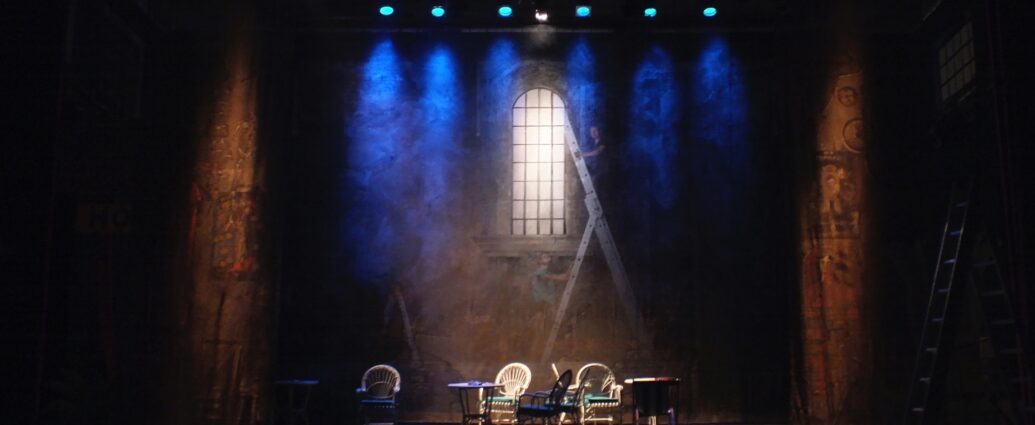Jelena Sofronijevic
Directed by Schele Williams, with music and lyrics by Greg Dean and Shaun Borowsky. This new musical promises to retell Nelson Mandela’s story. Both as an individual man and his part in the South African anti-Apartheid movement.
Centring Women
Mandela more quietly diverges from a standard ‘great man’ historical narrative. Madiba might be the father of modern South Africa, but subtle staging puts women and mothers at the heart of its story instead.
“When you strike a woman, you strike a rock.”
Whilst Nelson Mandela (Michael Luwoye) is locked in Robben Island, we see Winnie (Danielle Fiamanya) on the other side of the stage, in a parallel prison at home. 21 years of imprisonment pass before the two Mandelas touch again. Her husband is so physically disempowered, she starts to don his camo alongside her own domestic clothes. “When you strike a woman, you strike a rock,” she proclaims.
“Gender is one battleground on which apartheid is played out”
We see the multiple roles played by women whilst men were stuck in prison, being ‘protected by the public eye’. Long scenes are devoted to those left behind. As the next generation of young people is forced to learn Afrikaans at school. We sympathise when Winnie turns against non-violent resistance. Herself subject to 18 months of imprisonment and only anchored to sanity by children. When Mandela’s son dies, he can attend his funeral by letter alone.
Gender is one battleground on which apartheid is played out. Winnie argues that she married her husband because of his values, engaging in the struggle “for them, and for our family.” The anti-Apartheid activists proclaim their commitment to their motherland. While the white government speak of South Africa as their fatherland.
It’s one of many motifs repeated — and appropriated — on both sides. “Do what you must” is another mantra, used to justify both police violence and the personal decision to leave one’s family and take up the fight for freedom.
A theatrical endeavour
Hannah Beachler’s clever set uses levels, showing the fights on all fronts. Aloft in the UK, Adelaide Tambo (Lerato Gwebu) represents the movement overseas. On the ground, ordinary citizens hold their passbooks aloft — and are then shot into darkness, by Jon Clark’s chasmic lighting. It all heightens attention on Gregory Maqoma’s superb dance choreography — perhaps the production’s greatest triumph.
“It tells a very neat history, making the past appear simpler than it is”
Indeed, it is unashamedly musical — a format for which such a story has likely not been deemed appropriate in the past. As such, it tells a very neat history that only musicals can provide, making the past appear simpler than it is.
Earl Carpenter, a hammy Prime Minister, warns the West that their hands are tied, so dependent on the country for half of their oil, food, and vitamins. He chucks around a few lines about the wider geopolitics of Soviet Communism and the Cold War.
Inaccurate but accessible
Produced in partnership with the Mandela family, it’s little wonder that the man himself is so heroised. Here, he is disarmingly charming; simultaneously capable of maintaining his family’s affections from afar, getting white prison wardens on his side, and delivering deadly one-liners: “I do not make jokes. I deliver them.”
It’s a perfect, almost fairytale, ending, where Mandela calls for reconciliation, for “being free inside”. Black and white people — to whom all of South Africa supposedly belongs — dance together. But there are inconsistencies beyond the accents. We’re told black people must only wear shorts in prison, but we only ever see Mandela’s set in the trousers afforded their white counterparts.
“We can but hope the musical…sparks an interest in further research on the part of its audience”
It’s inaccurate, of course. We can but hope the musical makes this history more accessible and sparks an interest in further research on the part of its audience. It is a unique celebration, which raises interesting questions about race and representation.
- Mandela runs at the Young Vic until 4 February 2023.
Featured image courtesy of stefano stacchini on Unsplash. Image license can be found here. No changes were made to this image.

